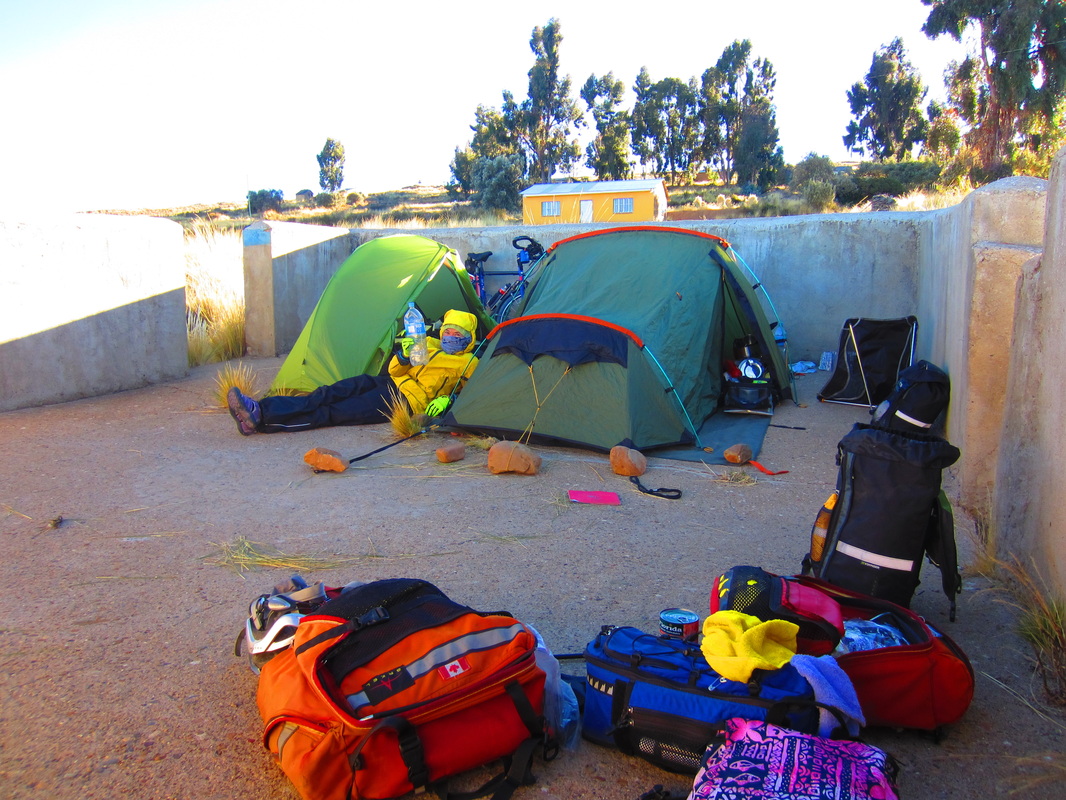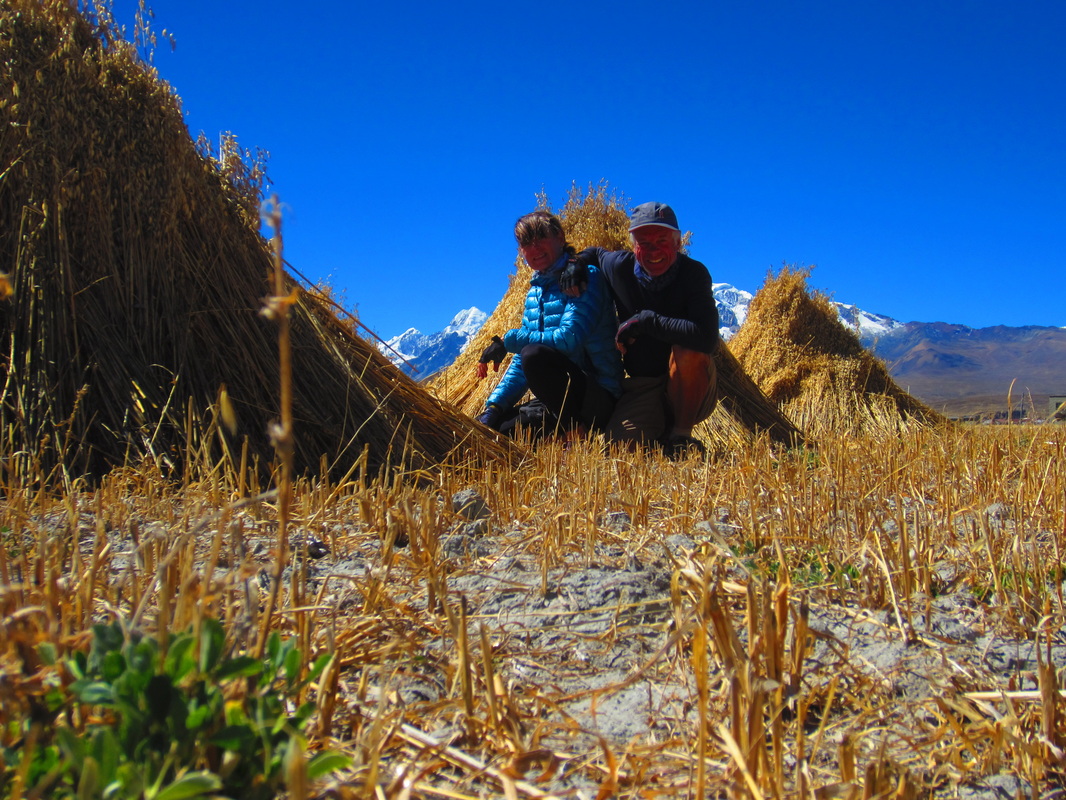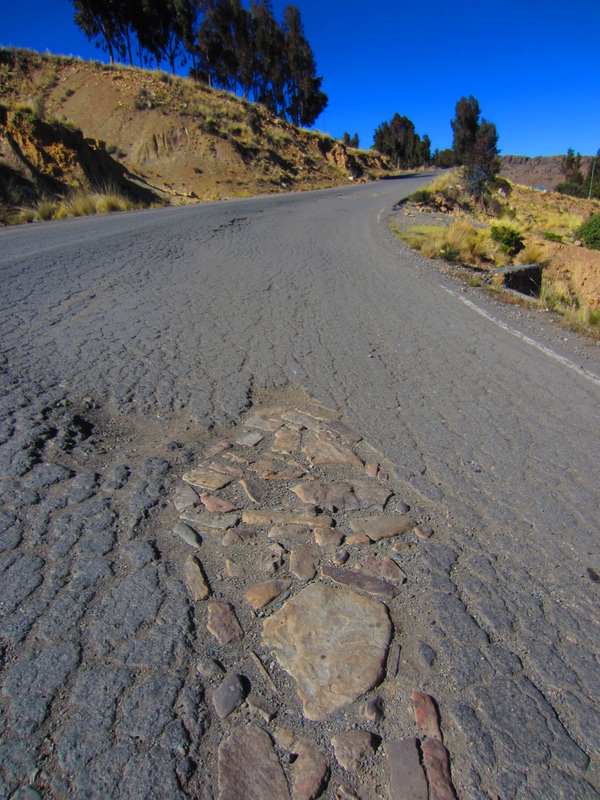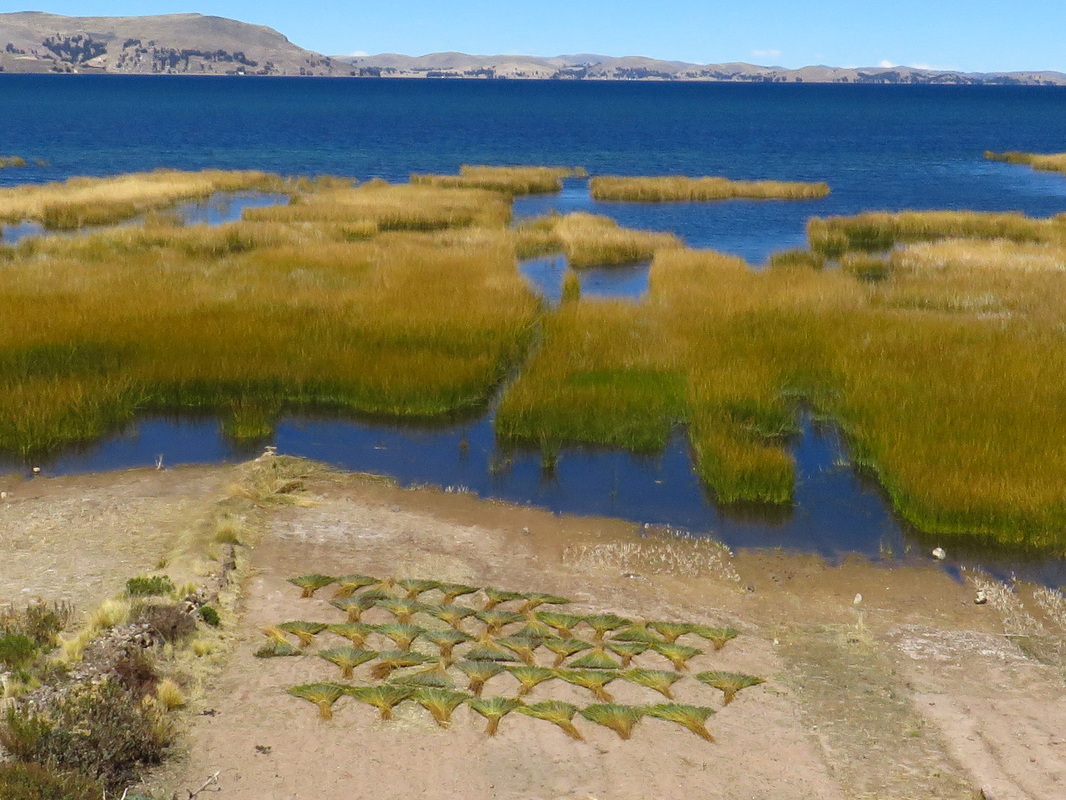25/7/2013 Puerto Acosta to Nth of Ancoraimes
D55, T7, Av12.19, Max79 Tot16842, 6775
Normal day
Arising early, we headed into the lower plaza, here in process was a market. Woman dressed in traditional clothing were sitting out from its perimeter, selling everything from a few red onions to chillies, bread, potatoes and cheeses.
We found a woman selling great panes for sandwiches. She also had these warm panes wrapped in heavy woven cloth in a basket, they were filled with cheese, so nice!, we had a couple each.
At one point at least 10 men and women were gathered around looking at my map. They had not seen many cyclists here before, especially ones with the beginnings of a grey beard.
These people had incredibly seasoned faces, faces parched by the sun during the many hours they probably had spent tending crops and animals. Their expressions borne of this labour were strong and in many cases humbling. How fortunate we are to have machinery to carry out the many tasks they must perform year in year out just to provide food for themselves and their families.
Leaving town and crossing the immigration point, we had no problems, they obviously all knew about proceedings last night.
From here the gravel road took us alongside a very low area at the time being used for cropping, that of wheat and avena ( grain used in porridge). Stock tethered on ropes were everywhere.
A farmer told me that these flats are under water during summer.
Wanting to change into cooler gear as the sun warmed us, looking for my sunglasses, they were not to found in my bar bag. The penny dropped. The gravel road the day before in all its roughness and the couple of wipeouts must have claimed them.
What a bugger, they were expensive. However, for me 6 months with one pair of sunglasses is good going. Hopefully they were undamaged and a Boliviano now has a flash pair of Bolles.
Riding past the many small communities, the smell of fresh human waste was present, one could argue, it is better spread out than concentrated in one place or drained to a body of water. The hot clear days would soon see to the desiccation and odour removal though. Of course it would all happen again tomorrow.
We lunched at Escoma in the plaza. Trucha (trout) was enjoyed on the plaza steps at a stall. Theses stalls are always run by woman who have all the food wrapped in heavy woven blankets for lack of a better word.
The trout we had was the tail sections of unusually large fish, oh so good.
Near Carahuco, with Deirdre some way ahead of me, due to my stopping and talking to people sorting potatoes near the road, they dry these little potatoes in the sun and then use them in all manner of foods, especially soups during the year, they are everywhere drying here, chuños is their name.
She had encountered a police road block, and made it through without questions. However on my approach, they called me in.
Checking my passport, the guy slide his fore finger across his throat, oh shit.
He wanted to know what we were doing here with no exit from Peru or entry to Bolivia.
After much explaining he let us pass. However he was adamant we were not to proceed to La Paz but go to Copacabana for formalities, this we were doing anyway.
We needed to speak again with Bernard from the Sicuani hospital about Deirdres dog bite.
The day was now cooling off rapidly as usual, it was about 1500 hrs. Views of the lake were with us now all the way as we climbed off the flats. This hill just kept going up. We were both at the end of our tethers. A camp site had to be found.
At one point two concrete enclosures were seen above the road. On inspection they were found to be a disused sheep and cattle dip. One side the cattle fell in the deep concrete trench joining the two unroofed enclosures, the other end had small steps so the animals would make contact with them as they swam for their lives. The exit side we slept in drained runoff back to the dip.
This was perfect for the night, out of the wind and sweeping views of Titicaca.
It is such a huge lake, on many occasions the view across it saw us taking in an aqueous horizon.
All afternoon I had been feeling a bit nauseous, and for two days had been getting these acute headaches at one point on the back of my head. Panadol sorted it rapidly, this however was no solution to the problem. Toilet visits were not as they should have been either.
Water was obtained from the farm over the road.
We hit the nest early due to the cold.
D55, T7, Av12.19, Max79 Tot16842, 6775
Normal day
Arising early, we headed into the lower plaza, here in process was a market. Woman dressed in traditional clothing were sitting out from its perimeter, selling everything from a few red onions to chillies, bread, potatoes and cheeses.
We found a woman selling great panes for sandwiches. She also had these warm panes wrapped in heavy woven cloth in a basket, they were filled with cheese, so nice!, we had a couple each.
At one point at least 10 men and women were gathered around looking at my map. They had not seen many cyclists here before, especially ones with the beginnings of a grey beard.
These people had incredibly seasoned faces, faces parched by the sun during the many hours they probably had spent tending crops and animals. Their expressions borne of this labour were strong and in many cases humbling. How fortunate we are to have machinery to carry out the many tasks they must perform year in year out just to provide food for themselves and their families.
Leaving town and crossing the immigration point, we had no problems, they obviously all knew about proceedings last night.
From here the gravel road took us alongside a very low area at the time being used for cropping, that of wheat and avena ( grain used in porridge). Stock tethered on ropes were everywhere.
A farmer told me that these flats are under water during summer.
Wanting to change into cooler gear as the sun warmed us, looking for my sunglasses, they were not to found in my bar bag. The penny dropped. The gravel road the day before in all its roughness and the couple of wipeouts must have claimed them.
What a bugger, they were expensive. However, for me 6 months with one pair of sunglasses is good going. Hopefully they were undamaged and a Boliviano now has a flash pair of Bolles.
Riding past the many small communities, the smell of fresh human waste was present, one could argue, it is better spread out than concentrated in one place or drained to a body of water. The hot clear days would soon see to the desiccation and odour removal though. Of course it would all happen again tomorrow.
We lunched at Escoma in the plaza. Trucha (trout) was enjoyed on the plaza steps at a stall. Theses stalls are always run by woman who have all the food wrapped in heavy woven blankets for lack of a better word.
The trout we had was the tail sections of unusually large fish, oh so good.
Near Carahuco, with Deirdre some way ahead of me, due to my stopping and talking to people sorting potatoes near the road, they dry these little potatoes in the sun and then use them in all manner of foods, especially soups during the year, they are everywhere drying here, chuños is their name.
She had encountered a police road block, and made it through without questions. However on my approach, they called me in.
Checking my passport, the guy slide his fore finger across his throat, oh shit.
He wanted to know what we were doing here with no exit from Peru or entry to Bolivia.
After much explaining he let us pass. However he was adamant we were not to proceed to La Paz but go to Copacabana for formalities, this we were doing anyway.
We needed to speak again with Bernard from the Sicuani hospital about Deirdres dog bite.
The day was now cooling off rapidly as usual, it was about 1500 hrs. Views of the lake were with us now all the way as we climbed off the flats. This hill just kept going up. We were both at the end of our tethers. A camp site had to be found.
At one point two concrete enclosures were seen above the road. On inspection they were found to be a disused sheep and cattle dip. One side the cattle fell in the deep concrete trench joining the two unroofed enclosures, the other end had small steps so the animals would make contact with them as they swam for their lives. The exit side we slept in drained runoff back to the dip.
This was perfect for the night, out of the wind and sweeping views of Titicaca.
It is such a huge lake, on many occasions the view across it saw us taking in an aqueous horizon.
All afternoon I had been feeling a bit nauseous, and for two days had been getting these acute headaches at one point on the back of my head. Panadol sorted it rapidly, this however was no solution to the problem. Toilet visits were not as they should have been either.
Water was obtained from the farm over the road.
We hit the nest early due to the cold.




